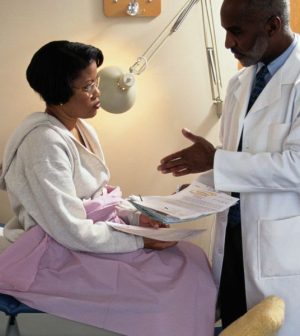- Could Your Grocery Store Meat Be Causing Recurring UTIs?
- Are You Making This Expensive Thermostat Error This Winter?
- Recognizing the Signs of Hypothyroidism
- 10 Strategies to Overcome Insomnia
- Could Artificial Sweeteners Be Aging the Brain Faster?
- Techniques for Soothing Your Nervous System
- Does the Water in Your House Smell Funny? Here’s Why
- Can a Daily Dose of Apple Cider Vinegar Actually Aid Weight Loss?
- 6 Health Beverages That Can Actually Spike Your Blood Sugar
- Treatment Options for Social Anxiety Disorder
5 Things You Should Know About Cervical Cancer

A little knowledge can go a long way in the fight against cervical cancer.
In fact, the more women know about the disease, the greater their chances of being able to prevent it, say cancer experts from the City of Hope, a cancer treatment and research center in California.
Death rates from cervical cancer have fallen by more than 50 percent in the past four decades as women have learned more about their risk and as increasing numbers have had Pap tests, which help doctors screen for the disease, the experts noted.
However, because this cancer often comes with no early warning signs, City of Hope urges women to protect their health by learning five things about cervical cancer:
1. The most common cause is human papillomavirus (HPV). Roughly 99 percent of cervical cancers are caused by this sexually transmitted infection. The most common strains of the virus, HPV 16 and HPV 18, are responsible for about 70 percent of all cases of the disease. Roughly 14 million new HPV infections are detected each year. Some clear up, but infections that persist can lead to serious health problems.
2. Cervical cancer is often preventable. The U.S. Food and Drug Administration has approved three HPV vaccines. The first was Gardasil, approved in 2006, to protect against HPV 16 and HPV 18. In 2009, the FDA approved Cervarix. A third vaccine, Gardasil 9, which was shown to be 97 percent effective in preventing cervical, vulvar and vaginal cancer and protecting against additional types of high-risk HPV strains, was approved in 2014. It’s recommended that young men and women, 9 to 26 years old, be vaccinated against HPV.
3. Lesbians and bisexual women are less likely to be screened for cervical cancer. City of Hope suggests this may be due to fear of discrimination, bad experiences with doctors in the past, and misinformation about cervical cancer.
4. All women 21 and older should get regular exams and screenings. This should include an annual pelvic exam and a periodic Pap test, considered a routine screening for cervical cancer. For a Pap test, cells are collected from the cervix so they can be examined for any abnormalities. Women in their 20s should get a Pap test every three years as long as their results remain normal. Women 30 to 64 years old should get a Pap test every five years as long as their results remain normal.
5. Warning signs of cervical cancer may be scarce. Cervical cancer may cause bleeding, but many women experience irregular periods so this may not seem unusual. Often, the disease does not cause pain or other obvious warning signs, making screening that much more important. Women who suspect a problem should not ignore their symptoms and seek a medical evaluation.
More information
The American Cancer Society has more on cervical cancer.
Source: HealthDay
Copyright © 2026 HealthDay. All rights reserved.










